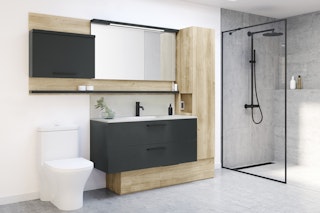Bathroom: The best moisture-resistant materials

What are the best water-resistant materials for bathrooms?
Professionals are well aware that humidity and temperature fluctuations in bathrooms are constant challenges. Selecting the right materials is crucial for ensuring long-term durability and a visually appealing finish. This guide provides an overview of the most suitable options, highlighting the features of materials specifically designed to withstand the unique conditions of a bathroom environment. Discover the top moisture-resistant materials to consider for your next project.
Different materials and their moisture resistance
Using equipment made from moisture-resistant materials is a fundamental approach to designing durable and aesthetically pleasing bathrooms. Knowing the characteristics of each material is also very helpful, as this perspective will allow you to make informed choices and meet your clients’ expectations.
Marble
Valued for its luxurious and unique appearance, marble is a porous material, making it prone to staining from water and bath products. Regular sealing is essential to enhance its water resistance. Commonly used for vanities, flooring, and occasionally sinks, marble offers good heat resistance. However, its susceptibility to scratches and cracks, along with its higher cost, are essential factors to consider.
Granite
A natural stone known for its durability and resistance to heat and scratching. Compared to marble, granite is less porous but still requires periodic sealing to prevent water absorption and staining. It’s frequently used for vanities and flooring. Its luxurious natural look is popular, although cost can be a limiting factor.
Quartz
Quartz is a highly water-resistant material, widely preferred by Vanico-Maronyx clients. Its non-porous surface makes it highly resistant to stains and bacterial growth. It does not require sealing and is easy to maintain. Available in a wide range of colours and patterns, quartz is commonly used for vanities. It generally costs less than marble but more than ceramic or porcelain, making it a practical and attractive choice.

Wood
There’s a significant difference between untreated solid wood and treated wood. Untreated wood tends to swell, warp, or crack in humid conditions. However, treated wood with water-repellent finishes—or naturally moisture-resistant exotic woods like teak or bamboo—can be used for vanities, shelves, flooring, and walls. Wood adds a natural, warm aesthetic when properly protected.
Engineered composites like PURESOLID
Exclusively offered by Vanico-Maronyx, PURESOLID is a composite made of natural minerals and innovative acrylic resin.
It is non-porous and offers excellent resistance to shocks, scratches, heat, and fire. This makes it highly hygienic and stain-resistant—ideal for sinks and vanity tops. Its silky, elegant surface retains its brightness over time thanks to UV stability, and it can even be restored on site if needed.

Tips for integrating moisture-resistant materials into professional bathroom projects
To successfully integrate moisture-resistant materials into your bathroom designs:
- Plan for moisture from the start: Identify areas most exposed to water and steam, such as showers, sinks, and bathtubs.
Ask the right questions:
- How often will this bathroom be used?
- Will children or seniors use it? That may impact your choice of anti-slip flooring, for example.
- Ensure proper ventilation to prevent moisture buildup, regardless of the material choice.
Select materials that are naturally water- and mould-resistant or have been specifically treated. For vanity tops, quartz and PURESOLID are excellent non-porous options.
- Ensure high-quality installation: Even the best materials require proper prep and sealing to perform well over time.
- Waterproof underlays and membranes are essential in shower and tub areas.
- Treated wood should have all edges and cut areas sealed to prevent moisture from entering.
- Vanity tops must be perfectly sealed at joints with sinks and backsplashes.

Conclusion
Selecting the right moisture-resistant materials is crucial for delivering long-lasting, visually appealing bathroom projects. Quartz and PURESOLID stand out for their non-porous, highly durable properties, which make them ideal for countertops and sinks. Treated wood and exotic species bring natural warmth when properly protected. For tailored, high-quality solutions, explore the innovative product lines from trusted manufacturers like Vanico-Maronyx, who offer a wide range of durable and stylish materials to meet your clients’ expectations.